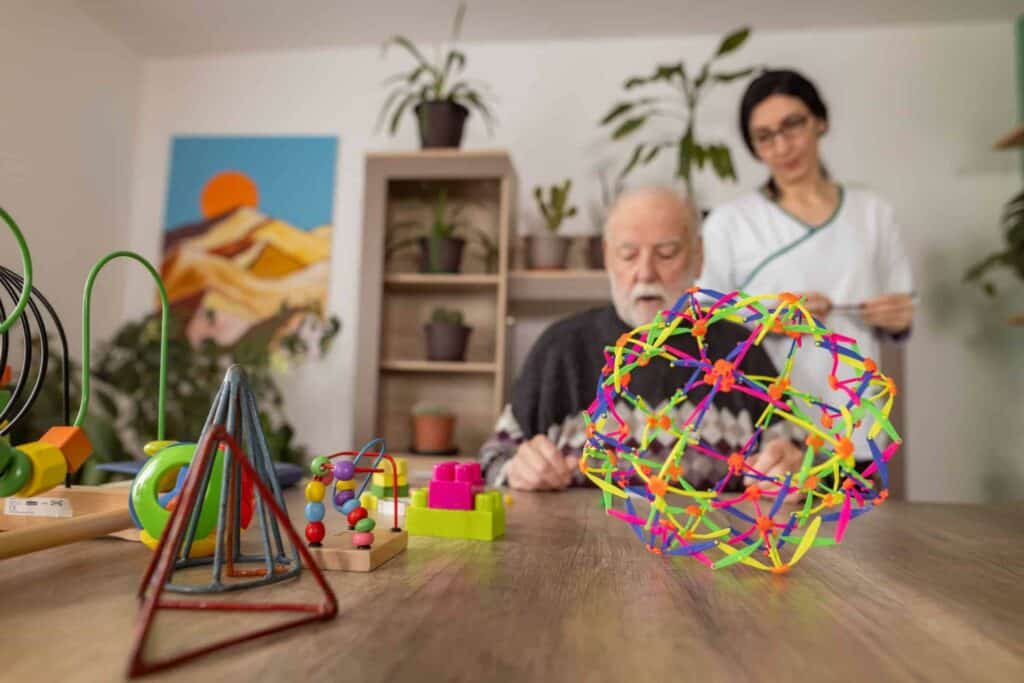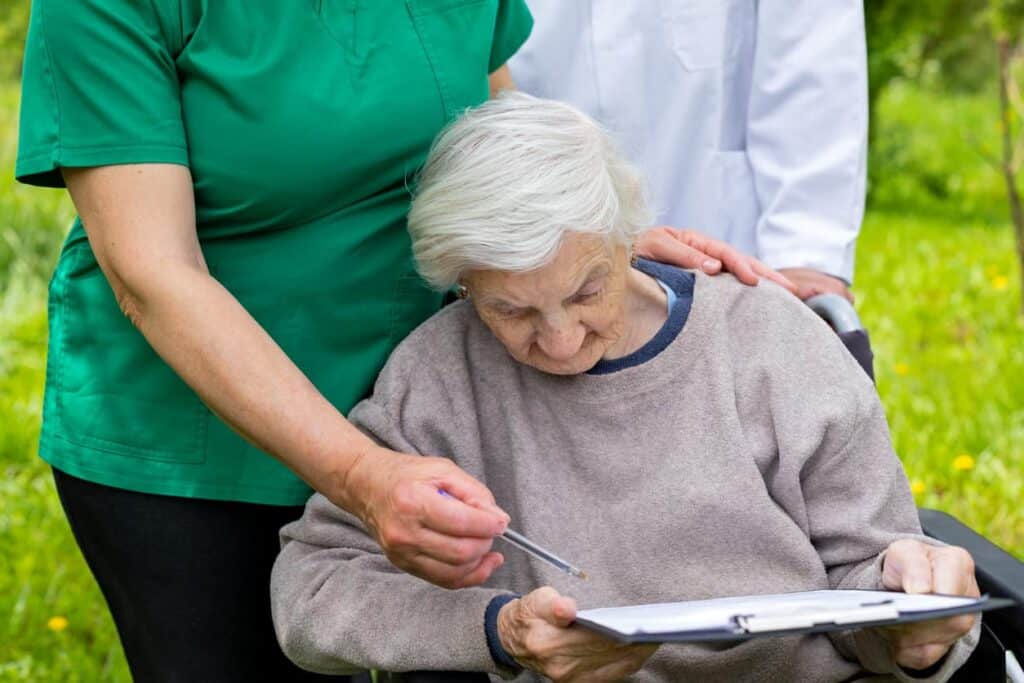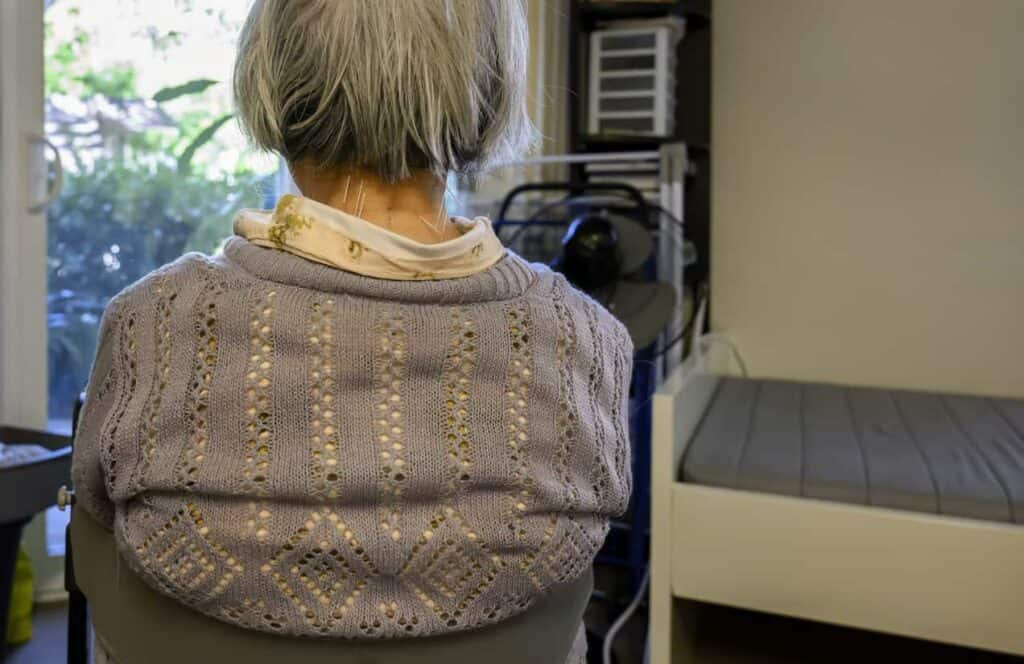Palliative care can make the lives of seniors better, especially when they’re dealing with serious or life-limiting health issues, such as cancer, Alzheimer’s, and heart disease.
This special kind of healthcare focuses on easing your loved one’s pain and stress, not just from a physical aspect but also emotionally and spiritually.
What Does Palliative Care Help With?
Performed by a team of specialists, palliative care can be a friend who’s there to help seniors feel comfortable and respected throughout their health journey. Palliative care doesn’t just tackle pain; it looks at the whole picture, considering what aging adults want and need for their well-being.
Care professionals support open talks about healthcare choices and let your beloved decide what’s best for them.
Palliative care doesn’t aid just seniors; it’s a big help for the whole family, too. It guides family members through tough decisions and helps them handle the emotional ups and downs that come with caring for an aging loved one.

[all family members can benefit from palliative care]
Suppose you can’t imagine how exactly palliative specialists achieve all of these goals. In that case, this article will be helpful as it sheds some light on the different types of palliative care, the details of each, and how they affect the well-being of aging adults.
What Palliative Care Is Not
Before moving on to the types of palliative care, let’s digress a little and debunk some misunderstandings about palliative care.
Not only end-of-life care
Palliative care is not the same as giving up or only about end-of-life care. It’s not just for people who are in the very last stages of an illness. Instead, it focuses on improving the overall quality of life for individuals dealing with serious or chronic conditions, regardless of whether the illness is curable or not, and regardless of the progression of their condition.
Not only about pain management
It’s important to understand that palliative care is not solely about managing physical pain. While pain relief is a part of it, palliative care also addresses emotional, social, and spiritual aspects of well-being. It is not limited to a specific medical treatment but rather considers the individual’s preferences and goals, involving them in decisions about their care.

Not giving up on illness treatment
Palliative care is not in opposition to curative treatments; it can complement and run alongside treatments aimed at curing diseases. It’s about enhancing the holistic well-being of the person and providing support to both the individual and their family.
Not the same as hospice care
Although both palliative care and hospice care aim to improve the quality of life for individuals with serious illnesses, they differ in timing, goals, and approach to curative treatments.
Hospice care is specifically for individuals with a life expectancy of six months or less, prioritizing comfort in the final stages of life and foregoing curative treatments. While palliative care is a broader approach, hospice care is a specialized form of palliative care tailored for end-of-life situations.
In essence, palliative care is not about giving in to illness or just for end-of-life; it’s about providing comfort, dignity, and support throughout the entire course of an illness, recognizing and respecting the person behind the patient.
Types of Palliative Care
Palliative care encompasses various types of interventions and support to address the physical, emotional, social, and spiritual needs of individuals with serious illnesses.
Some common types of palliative care include:
Pain and Symptom Management
Discomfort and pain can be debilitating for someone with a serious illness. In this regard, care focuses on alleviating physical pain through medications, therapies, and other techniques to improve the patient’s comfort.
Specialists, as doctors and palliative care nurses, strive to address a wide range of symptoms, such as nausea, fatigue, shortness of breath, and anxiety, to enhance overall well-being.
Finding the reasons and applying various interventions such as drugs, acupuncture, therapeutic massage, ice, and heat packs are some of the methods for dealing with chronic pain.
Commonly used medications are NSAIDs (non-steroidal anti-inflammatory drugs), opiates, antidepressants, antiepileptics, and steroids. Sometimes, radiotherapy may be used to allay bone pain.
Psychological support
This includes counseling, therapy, and assistance in coping with the emotional challenges of an illness.
As part of the palliative care team, psychologists can help your loved one cope with stress, changes of identity, and feelings of loss. It is not uncommon for seniors with life-limiting illnesses to face emotional and mental challenges. These can manifest as depression, anxiety, trauma, feelings of grief, or cognitive decline.
Psychotherapy successfully reduces the symptoms in seriously ill seniors and increases their quality of life. Thus making room for appreciation of everyday little pleasures and engagement in decision-making regarding their care.
Elements from therapies, such as cognitive-behavioral therapy, acceptance and commitment therapy, and dialectic behavioral therapy, have been found helpful when addressing seniors’ feelings of worry and trauma.

Interactions with a psychologist can help your loved one record their legacy and discover how meaningful their life has been. This can relieve their anxiety and even have a positive effect on their problems with breathing.
Additionally, therapies are beneficial not only for the seniors but also for the whole family and other palliative caregivers in their lives. Partaking in support groups and having open conversations with someone who knows what difficulties family and friends are going through can be life-changing.
Social Assistance
Social workers are crucial in palliative care, contributing to the holistic well-being of individuals facing serious illnesses and their families.
They conduct thorough assessments to identify the psychosocial needs of patients and their families. This includes considering factors such as family dynamics, coping mechanisms, mental health, and the impact of the illness on daily life.
Additionally, social workers assist in facilitating discussions about advance care planning, helping patients articulate their healthcare preferences, values, and goals for end-of-life care.
They can also help complete advance directives (the legal documents that provide instructions for medical care and only go into effect if you cannot communicate your wishes) and ensure that these documents are communicated to healthcare providers.
Another aspect of the care provided by social workers is the collaboration with the healthcare team to coordinate various aspects of care, including medical, psychosocial, and community resources. They help ensure that patients receive comprehensive and integrated support.
Spiritual Guidance and Care
Recognizing the importance of spirituality, palliative care specialists offer spiritual support aligned with your beloved’s beliefs and values. This may include chaplaincy services, meditation, or discussions about meaning and purpose.
Serious illnesses often provoke us to grapple with existential questions and spiritual concerns. The role of spiritual or pastoral care providers is to offer a safe space for your loved one to explore these issues, providing emotional support and helping them find meaning and purpose.
Ultimately, this can provide comfort, solace, and a sense of hope to those facing the challenges of a life-limiting illness. Chaplains offer a spiritual presence that can be a source of strength and encouragement during difficult times.
If your beloved has religious beliefs, spiritual care will involve facilitating religious practices, rituals, prayers, or sacraments according to their faith traditions. This helps seniors maintain a connection to their spiritual beliefs and practices.

Moreover, spiritual care extends beyond personal guidance to provide ongoing support for the families. Chaplains and spiritual care providers offer counseling, rituals, and memorial services to help families navigate the process.
Overall, spiritual care focuses on nurturing a sense of connection—whether it be with a higher power, nature, or one’s inner self. Spiritual care providers often emphasize the importance of being present in the moment, promoting mindfulness and peace.
Financial Help
There are various avenues for a palliative care team to assist your loved one and your family in coping with the economic challenges associated with serious illnesses. The costs of the hospital bills and treatments can pile up, and your beloved may require assistance with childcare or pet care during their illness.
Social workers or financial counselors can discuss billing and insurance matters, guide your loved one in applying for disability payments or medical leave, identify programs offering affordable medications, and explore other financial alternatives.
What is more, they can advocate on behalf of the seniors to secure financial support during their illness.
Palliative care team members are often knowledgeable about government assistance programs. They can help your beloved explore options such as Social Security Disability Insurance (SSDI), Supplemental Security Income (SSI), or other local and state assistance programs.
It is not uncommon for social workers to collaborate with nonprofit organizations and charitable foundations that offer financial assistance to individuals dealing with specific illnesses. These organizations may provide grants or support for various expenses.

Social workers are also often well-connected to local community resources. They can assist you or your loved one in accessing services such as food assistance programs, transportation services, and housing support, thereby alleviating some financial burdens.
Part of palliative care is discussing advance care planning, which can encompass financial matters. This involves helping the seriously ill articulate their preferences regarding financial decision-making, power of attorney, and other key financial aspects in the context of their healthcare.

Palliative Care Team Members
Since the scope of palliative care is quite broad to be able to achieve all it sets out for, a multidisciplinary group of healthcare professionals and support staff needs to be gathered. Each of these team members contributes their expertise to address the diverse needs of a loved one facing serious illnesses and their family.
The foundation of the team comprises a doctor, a nurse, and a social worker. However, it is common for therapists, chaplains, dietitians, and rehabilitators to join the palliative care team as well.
The composition of the team will vary based on the specific healthcare setting and the needs of the senior. Hospitals and care centers typically have their palliative care teams, while high-end facilities, such as Amy’s Eden, assemble teams tailored to the needs of their residents.
The palliative care team roles are distributed approximately in the following way:
- The Palliative Care Coordinator
This individual helps coordinate the various aspects of care, ensuring that your loved one receives synchronized and comprehensive support. They also assist with communication among team members and facilitate care transitions.
- Physician or Nurse Practitioner
A primary healthcare provider who specializes in palliative care oversees medical management, treatment plans, and coordination with other healthcare providers.
- Nurses
Registered nurses with expertise in palliative care provide hands-on medical care, manage symptoms, and offer emotional support to patients and families.
- Social Workers
Social workers play a crucial role in addressing psychosocial needs. They provide emotional support, assist with advance care planning, and help navigate complex social and financial issues.

- Chaplains or Spiritual Care Providers
Pastoral care providers offer support based on your beloved’s spiritual or religious beliefs. They assist in addressing existential concerns and provide emotional and spiritual comfort.
- Pharmacists
Pharmacists contribute by managing medication regimens, ensuring proper pain management, and addressing any side effects or drug interactions.
Physical therapists focus on maintaining or improving seriously ill seniors’ physical condition and mobility, enhancing their overall quality of life.
Occupational therapists help seniors adapt to changes in daily activities, foster their independence, and improve their ability to engage in meaningful tasks.
- Psychologists or Counselors
Mental health professionals provide counseling and emotional support, addressing psychological distress and helping your beloved cope with the emotional challenges of illness.
- Nutritionists or Dietitians
Nutrition experts address the seriously ill’s changed dietary needs, managing illness-related challenges, and maintaining optimal nutritional status.
- Volunteers
Volunteers can be members of the community or the family who have been trained. They can offer help around the house, offer companionship, respite care for caregivers, and support with daily errands. They play a valuable role in enhancing the overall well-being of patients and families.
- Alternative therapy practitioners
Complementary therapies such as acupuncture, aromatherapy, reiki, yoga, tai chi, etc., can also contribute to the well-being of your loved one. It is important to note that these less conventional therapies are usually conducted in parallel with the medical treatments and not at their expense.

Questions You May Want to Ask the Palliative Care Team
When engaging with a palliative care team, asking questions to gather information, understand the care plan, and address any concerns is essential. We have compiled the list below to help you get started.
The Plan of Care
-
- What are the goals of the palliative care plan for me/my loved one?
- Can you explain the specific treatments and interventions included in the care plan?
- How often will the team assess and update this plan?
- Communication and Coordination
- What is the best way to reach out to team members with questions or concerns?
- Will there be regular team meetings to discuss the progress and adjust the care plan accordingly?
- How will the palliative care team coordinate with my primary doctor and other specialists?
- Are there additional support services, such as social work or physical therapy, available through the palliative care team?
- Pain and Symptom Management
- What are the strategies for managing my pain and other symptoms?
- Are there potential side effects or risks associated with the medications or treatments prescribed?
- How can I or my family communicate changes in symptoms between scheduled visits?
- Psychosocial Support
- How does the team address the emotional and psychological needs of the patient and family?
- Are counseling or support services available for emotional well-being?
- Financial and Practical Support
- Can the team guide financial aspects, such as insurance coverage and assistance programs?
- Are there resources available for practical support, such as transportation or assistance with daily tasks?
- How can the team assist with navigating disability benefits or medical leave?
- Spiritual and Cultural Considerations
- How does the team address my and my family’s spiritual and cultural needs?
- Are there chaplaincy services or support for specific religious or cultural practices?
- Will my values and beliefs be incorporated into the care plan?
- Advance Care Planning and Decision-Making
- Can the team help facilitate discussions about advance care planning and end-of-life decisions?
- What resources are available to assist with creating advance directives or living wills?
- How does the team support my autonomy in decision-making?
- Caregiver Support
- Are there resources or support services available specifically for caregivers?
- How can caregivers access respite care or assistance with their well-being?
- What educational resources are provided to help caregivers navigate their roles?
- Follow-Up and Transitions
- What is the plan for follow-up care, and how often will the team reassess my needs?
- How does the team assist with transitions between care settings, such as hospital to home or vice versa?
- What information will be provided to the primary care team when the palliative care phase concludes?
Asking these questions can help you better understand the palliative care process, ensure effective communication, and actively participate in your loved one’s care.
Overview
Suppose you have just been diagnosed with a serious or life-limiting condition, or you have been living with this diagnosis for some time. In that case, you can benefit immensely from engaging with a palliative care team.
This type of care does not equal giving up on treatment or end-of-life care. Palliative care is there to make your life with the illness more comfortable, enjoyable, and meaningful.
Palliative care is multi-faceted and holistic because it has to counteract the overwhelming influence of your condition. After all, the illness affects not only your physical body but also your mental functioning, emotional state, family relations, personal economy, and more.
Therefore, palliative care is not one man’s job. It is delivered through a team of specialists, each of whom strives to make your life and the lives of those around you more manageable, meaningful, and pleasant.
Have questions or want to learn about the extent of our palliative care services, please reach out to us at Amy’s Eden, or call us directly at (775) 884-3336. Our palliative care specialists are here to answer any questions you may have.




